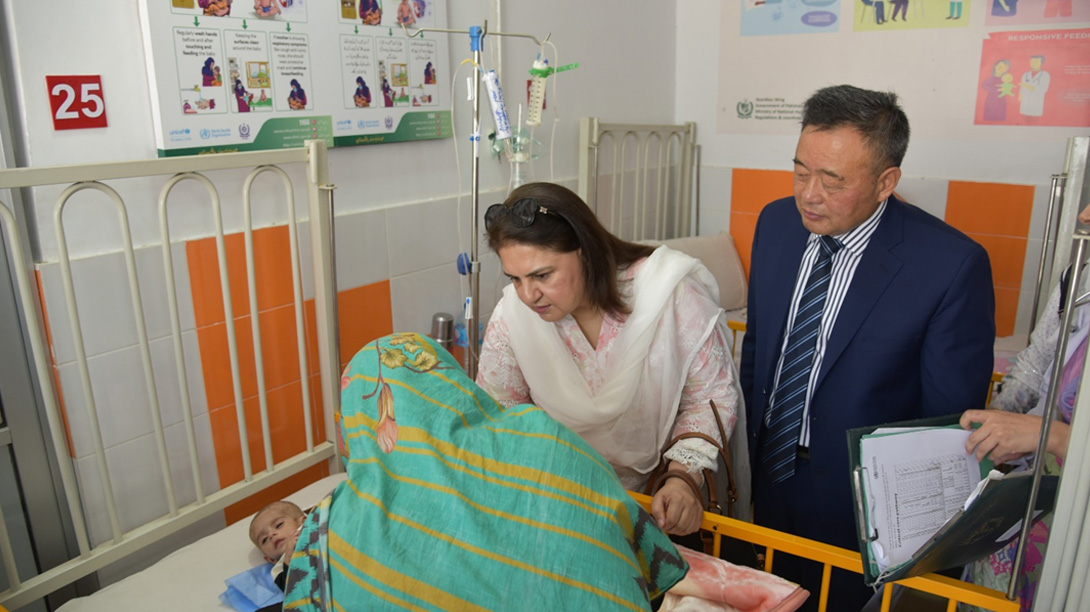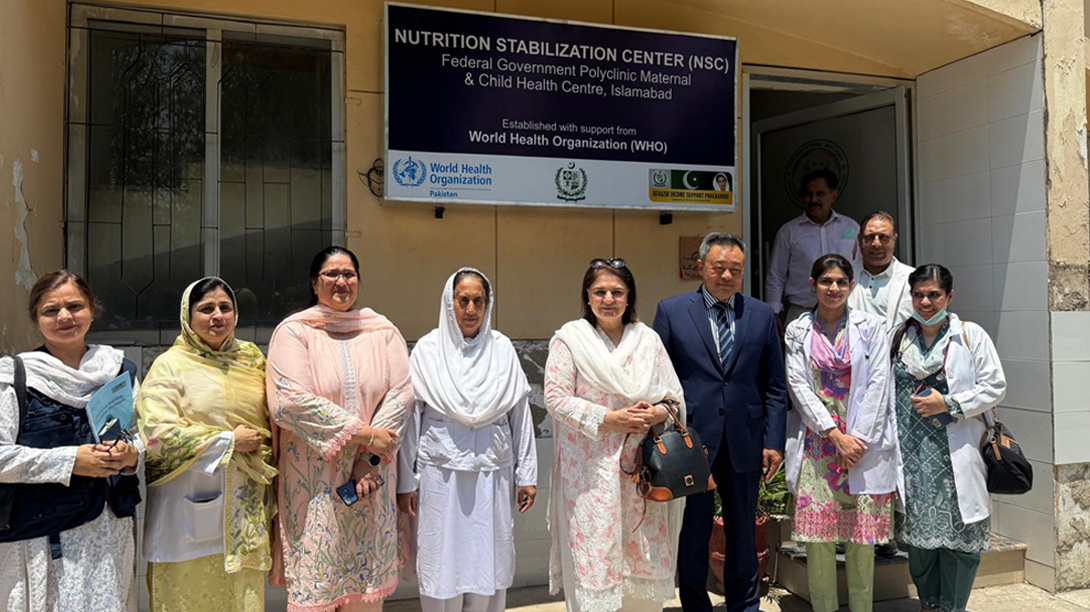 Benazir Income Support Programme Chairperson Senator Rubina Khalid and WHO Representative in Pakistan Dr Dapeng Luo visit the Nutrition Stabilization Centre at the Federal Government Polyclinic Hospital, Islamabad. Photo credit: Sara Akmal/WHO
Benazir Income Support Programme Chairperson Senator Rubina Khalid and WHO Representative in Pakistan Dr Dapeng Luo visit the Nutrition Stabilization Centre at the Federal Government Polyclinic Hospital, Islamabad. Photo credit: Sara Akmal/WHO
4 June 2025, Islamabad, Pakistan – The World Health Organization (WHO) and Pakistan’s Benazir Income Support Programme (BISP) met yesterday to expand the partnership through which they are providing each year life-saving treatment to 43 000 children under 2-years-old affected by severe acute malnutrition with medical complications. Currently, this service is being delivered in 169 nutrition stabilization centres (NSCs) across the country.
The meeting included a visit, ¬¬led by BISP Chairperson Senator Rubina Khalid and WHO Representative in Pakistan Dr Dapeng Luo, to the stabilization centre located at the Federal Government Polyclinic, Islamabad.
"I am truly thankful to the World Health Organization for this valuable partnership. BISP is working across Pakistan, and with WHO’s support we aim to reach even more vulnerable families. We want to strengthen and expand our efforts so that no mother or child is left behind. When we work together, success becomes possible. We will continue to hold more interactive meetings and awareness sessions to reach people through counselling and support. Stunting is not just about physical growth – it also affects a child’s mental development. That’s why we must act early and work together with dedication. Healthy mothers and children are the foundation of a strong and prosperous Pakistan. This is not just an option – it is our responsibility," said BISP Chairperson Senator Rubina Khalid.
Under the umbrella of the Benizair Nashonuma programme to combat stunting and malnutrition, WHO-supported centres funded by BISP have treated 46 000 children since 2022 and provided counselling to over 64 000 mothers and caregivers. In 2025, WHO will support 199 centres – 169 of them funded by BISP – to treat close to 80 000 children under-5 per year, while providing counselling to 120 000 mothers and caregivers. For almost 2 decades, WHO has been supporting nutrition stabilization centres across Pakistan to save the lives of children that otherwise would have not survived.
 BISP Chairperson and the WHO Representative in Pakistan meet medical staff at the Nutrition Stabilization Centre and the leadership of the Federal Government Polyclinic Hospital. Photo credit: WHO The percentage of children cured in the stabilization centres is over 98%, far exceeding the minimum international standard of 75%.
BISP Chairperson and the WHO Representative in Pakistan meet medical staff at the Nutrition Stabilization Centre and the leadership of the Federal Government Polyclinic Hospital. Photo credit: WHO The percentage of children cured in the stabilization centres is over 98%, far exceeding the minimum international standard of 75%.
“A 98% cure rate is an excellent result and it reflects the good work that has been done, but even a single child lost to malnutrition is already one too many. These children are not just numbers; each of them has a story, and a family with dreams for their future. WHO is fully committed to continuing and expanding our collaboration with BISP and partners to reach every child and address new challenges such as climate change, which is exacerbating acute malnutrition in Pakistan. We are thankful and proud to partner with BISP to save the lives of the most vulnerable children,” said WHO Representative in Pakistan Dr Dapeng Luo.
WHO works on the early detection of cases in close collaboration with Pakistan’s national and provincial authorities, medical facilities and other UN agencies like the World Food Programme (WFP) and United Nations Children’s Fund (UNICEF). WFP works on the prevention and detection of cases in the communities and refers them to WHO – if the case is severe – or to UNICEF, which supports the outpatient services for less severe cases. When required, UNICEF will refer cases to WHO. Besides this referral system, families also go directly to the nearest emergency room or nutrition stabilization centre, in many cases with their child already in bad condition.
WHO’s support includes technical guidance, human resources and operational assistance ¬– covering infrastructure and the provision of therapeutic supplies, the promotion of best practices and evidence-based counselling.
Pakistan is among the 10 countries in the world where more than half of the population under-5 suffers from stunting or wasting, or both. The prevalence rate of stunting among children under-5 is 40% – amounting to 10 million stunted children – and that of wasting is 17.7 percent, resulting in 5 million wasted children.
The cost of inaction is far greater than the cost of action. In addition to the loss of lives, acute malnutrition – which in Pakistan is being exacerbated by climate change – is hampering the country’s efforts to advance the 2030 Agenda and its Sustainable Development Goals (SDGs), causing an annual economic loss of US$ 17 billion, equivalent to 6.4% of the country’s Gross National Income (GNI).***
For additional information, please contact:
Maryam Yunus, National Professional Officer – Communications, WHO Pakistan, This e-mail address is being protected from spambots. You need JavaScript enabled to view it (copying This e-mail address is being protected from spambots. You need JavaScript enabled to view it )
José Ignacio Martín Galán, Head of Communications, WHO Pakistan, This e-mail address is being protected from spambots. You need JavaScript enabled to view it
About WHO
Founded in 1948, WHO is the United Nations agency that connects nations, partners, and people to promote health, keep the world safe and serve the vulnerable. We work with 194 Member States in 150+ locations – so everyone, everywhere, can attain the highest level of health. For more information, visit https://www.emro.who.int/countries/pak/index.html. Follow WHO Pakistan on Twitter and Facebook.




